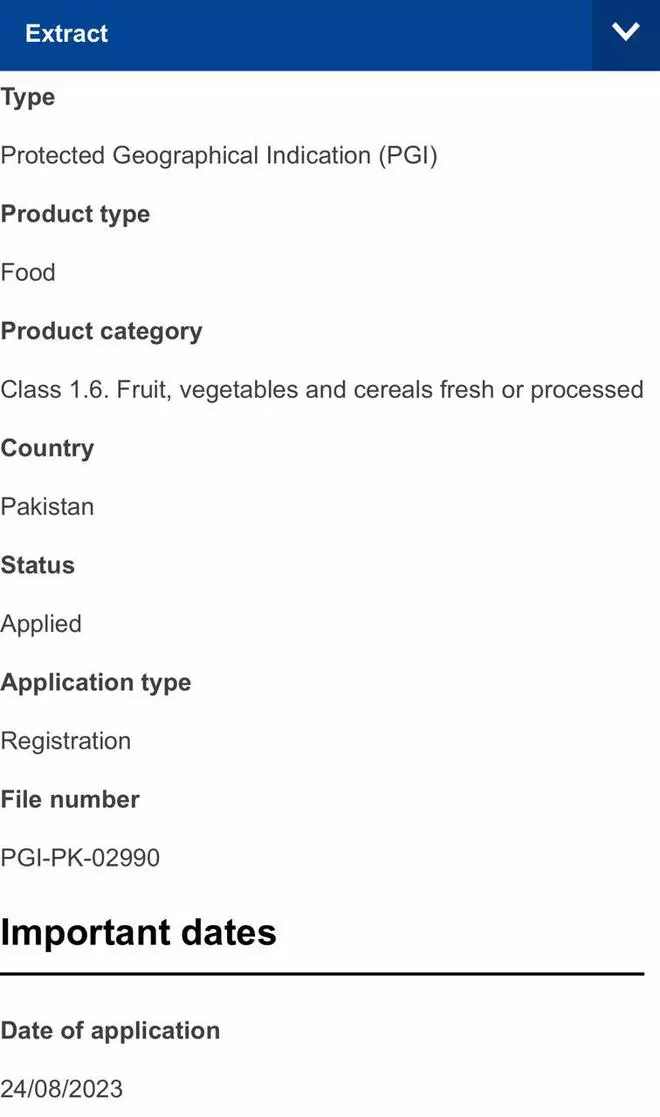The European Commission (EC) seems to be working with Pakistan to help the latter get the Geographical Indication (GI) tag for its basmati rice even as it has put in cold storage India’s basmati GI application pending since July 2018.
A fortnight ago, the EC made public its database eAmbrosia showing that Pakistan has applied for GI tag for its basmati rice. But there are surprising aspects to the whole aspect of Pakistan’s filing.
Islamabad published its definition of basmati rice, a must for getting GI tag, on August 28, 2023. But the neighbouring country’s status was updated on eAmbrosia on August 24, 2023!
Why withhold?
“It indicates an active communication and facilitation between Pakistan authorities and the EC. The million-dollar question is why did the European Commission withhold the status ‘applied’ for Pakistani application of basmati rice in eAmbrosia for the public since August 2023,” wondered S Chandrasekaran, a GI expert who has written the book “Basmati Rice: The Natural History Geographical Indication”.

The EC database showing Pakistan seeking GI tag for its basmati rice
In July 2023, responding to a question from the Federation of Rice Millers, Europe, the EC said, “The Indian application for protection of basmati as a GI is under scrutiny by the commission. The process is ongoing so no further information can be communicated at this stage.”
But experts question how the EC registered Pakistan’s GI application in eAmbrosia even before it published its definition.
Providing a window
In March 2021, Pakistan and Nepal opposed India’s application for GI in the EU by serving notices. Following this, the EC initiated a process of consultation between the three nations but it did not fructify. “Between March 2021 to August 2023, the EU provided a window to Pakistan to prepare its GI application for basmati rice. As per EU norms, it has to close the case (GI application) within six months,” said.
EU regulations stipulate five statuses for a GI application. They are “applied, published, opposed, cancelled and rejected”. “Applied” status is preliminary and pertains to the category of receiving the application. Between “applied” and “published” status the application undergoes serious examination.
Diplomatic crisis on cards?
Chandrasekaran said the next stage of Pakistan’s application will be to publish it in the official journal of the EC. But this could give rise to a diplomatic crisis. “For sure, India will oppose in view of two factors — historic reputation and map submitted by Pakistan,” said Chandrasekaran.
The problem is Pakistan will submit a map which will show Jammu and Kashmir as part of its territory. “The moment the EU publishes the application it will show Pakistan’s map including Jammu and Kashmir. It is a direct questioning of India’s sovereignty,” said an expert without wishing to identify.
Putting pressure on India
Experts said the EU’s ploy could be to get maximum benefit from its ongoing talks with India on the free trade agreement (FTA). On the other hand, it runs the risk of India totally shunning the FTA and keeping away from the talks on GI.
During the time that the Indian GI application has been pending with the EU, the latter tried to force India to amend its application by including the basmati-growing areas in Pakistan or submit a new joint application along with Pakistan.
Indian officials said in March 2023 that the EC is “feeling obliged to protect basmati originating from Pakistan (as well as India) and it prefers a single registration for Basmati “to respect the rights of both origins”.
‘Moment of truth’
In July 2023, the EC told FERM that GI negotiations are going on with India and there “have been three rounds so far”. It said, “Negotiations were suspended due to change of chief negotiator on the Indian side…. Discussions are still focussing on the text of agreement, we didn’t exchange yet the list of GIs with India.”
Chandrasekaran said the GI tag for basmati will be a test case and “moment of truth for India-EU trade deal”. In March 2023, official sources told businessline that the European Commission received details of Pakistan-growing areas and was expected to ask Pakistan to demonstrate that the growing areas satisfy the environmental factors of the single document as presented by India in its GI application.
The sources said the Commission is hoping to draw a single document with its officials sitting along with Indian and Pakistani officials.
EU usual claim
So far, India has got a Geographical Indication tag for basmati in four countries and certification marks for basmati in seven countries, including the UK and China.
“Application for GI, certification marks and logo have been filed in over 20 foreign jurisdictions to register basmati. Major foreign jurisdictions where India’s applications for these are under various stages of processes include the EU, the US, New Zealand, Australia, Canada, Sri Lanka, etc,” former APEDA Chairman M Angamuthu said in early 2023.
The EC usually claims that European immigrants carry a protected product name into their new home territory and use it commercially, as has occurred in Latin America, South Africa and the US. “The GI claim of Pakistan in Basmati is equivalent to the issue of European immigrants’ demand in wine,” said Chandrasekaran.





Comments
Comments have to be in English, and in full sentences. They cannot be abusive or personal. Please abide by our community guidelines for posting your comments.
We have migrated to a new commenting platform. If you are already a registered user of TheHindu Businessline and logged in, you may continue to engage with our articles. If you do not have an account please register and login to post comments. Users can access their older comments by logging into their accounts on Vuukle.